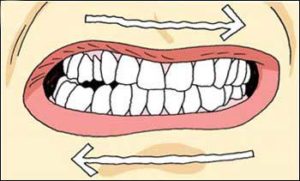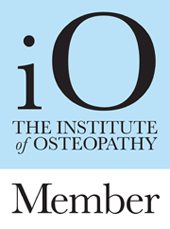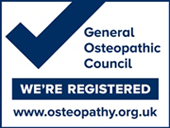Osteopathy & teeth grinding
Introduction
A large number of our osteopathic patients visit the clinic complaining of neck pain, neck and jaw stiffness, headaches and facial pain. Their symptoms are often worse in the morning and when we dig a bit deeper with our case history and examination, it becomes apparent that these patients have one underlying habit in common: clenching and grinding of the teeth.
Patients are often totally oblivious to grinding their teeth. Perhaps it is their partners who hear them at night. A few patients may catch themselves doing it during the day. Some patients only learn that they do it after being referred to the dentist to check for wear and tear in their teeth by an osteopath. Most affected patients are surprised to discover just how common teeth grinding is, affecting up to 1 in 12 of the UK population.
Causes & symptoms
Grinding and/or clenching of the teeth is called bruxism. Commonly bruxism is a symptom of worry or anxiety, beginning during a period of stress (e.g. exams, the start of a new job, relationship difficulties). Bruxism can also be a side effect of anti-depressant medications.
Most of the pain associated with bruxism comes from muscle tension in the neck, the jaw and at the base of the skull. The jaw (the temporo-mandibular joint or TMJ) is incredibly powerful and teeth grinding uses not only the main jaw muscles but also the accessory stabilising muscles, which are located in the neck and at the base of the skull. It is these muscles at the base of the skull that most commonly cause headaches. Some of this muscle tension can lead to stiffness in the neck joints and the heavy grinding directly affects the TMJ and teeth. Over time wear and tear can occur in these structures.
Osteopathic treatment & long-term management
Osteopathic treatment for bruxism aims to release the stiff neck joints and TMJ, easing the tension in the associated muscles and subsequently giving the patient relief. We use a range of different techniques to suit the individual with their consent, including muscle energy techniques, assisted stretches, cervical articulation and manipulation, intra-oral muscle release and soft tissue work.
Long-term management for bruxism often involves the patient obtaining a bespoke mouth guard from the dentist to protect the teeth from wearing down and to reduce some of the grinding at night by making it more difficult to clench the teeth.
In addition, discovering the root cause of the bruxism is important. If the patient is taking any medication for depression or anxiety, they should contact their GP to confirm that the grinding is not a potential side effect of the drug(s).
In most cases the symptoms of bruxism are stress-related. As such managing this stress is very important. Hypnotherapy can produce very positive results in this regard. Meditation and exercise can also help with high levels of stress.
For most people, getting through the stressful period of time is enough to stop the grinding and with the help on an osteopath, the symptoms may settle down completely.
If you would like to discuss your teeth grinding symptoms with a member of our Woburn Osteopaths team, please feel free to contact us: 01525 290615 / [email protected].
Additional information can be found at: www.bruxism.org.uk



